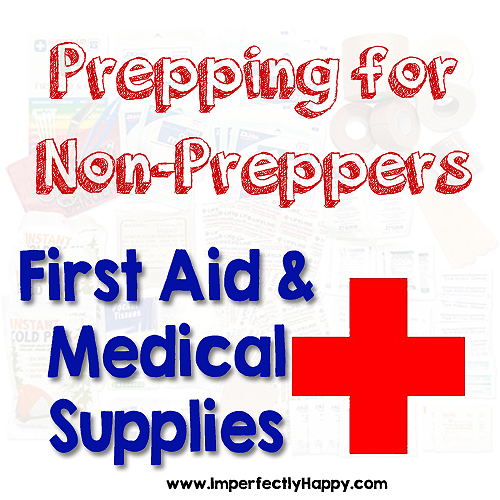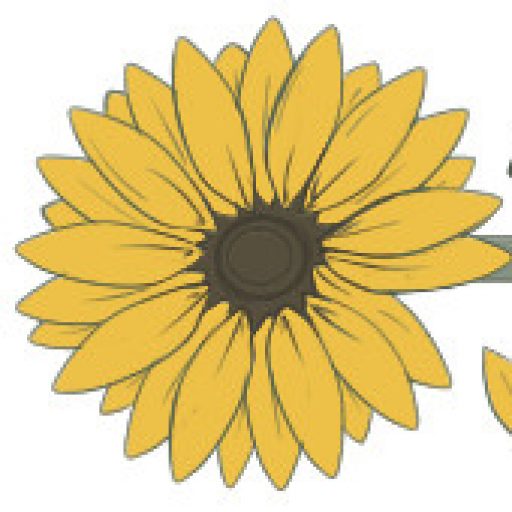Prepping First Aid Skills and Supplies is the fourth week in my 5 week, Prepping for Non-Preppers, series. This week we’re going to dive into prepping first aid skills and medical supplies. We need to build a medical kit that is prepared for the unexpected. How prepared are you? Could you treat minor wounds during an emergency? Do you have the right supplies? What if there was no way to call 911?
 I think we need to break these preps into 2 distinct categories – the first is the supplies you should have in your storage and second are the skills you need to have or acquire.
I think we need to break these preps into 2 distinct categories – the first is the supplies you should have in your storage and second are the skills you need to have or acquire.
Prepping First Aid – Medical Supplies for Your Home
Unless you’re in the medical industry, you may feel overwhelmed by what supplies you want to keep on hand; past band aids and neosporin. So let’s start with some basics (in alphabetical order):
- ABD Pads
- Ace bandages – in multiple sizes
- Adhesive bandages (band aids) in various sizes
- Adhesive tape
- Antibiotic ointment
- Anti-Itch ointment
- Alcohol and/or peroxide
- Bulb suction device for flushing out wounds
- Butterfly bandages for closing wounds, wound glue would be something to consider too
- Cotton balls and cotton swabs
- CPR Shields
- Disposable latex or synthetic gloves (never touch an open wound without them)
- Duct tape (Check out Duct Tape 911)
- Finger splint/s
- Gauze pads and roller gauze in assorted sizes
- Hand sanitizer (soap is better if you can wash up first)
- Instant cold packs
- Plastic bags for safe disposal of hazardous material
- Safety pins in multiple sizes
- Scissors
- Sterile eyewash
- Sterile dressings
- Thermometer
- Tweezers
Medications
- Activated charcoal
- Aloe vera gel
- Antacid
- Anti-diarrhea medication
- Aspirin and non-aspirin pain reliever
- Calamine lotion
- Children’s pain and fever reducers
- Laxative
- Oral antihistamine
- Personal medications
- Syringe, medicine cup or spoon for measuring and dispensing medications
- Vitamins you take on a regular basis
You’ll want to keep these supplies where they can be easily accessed (but not for little ones) and organized. I like using a large tackle box. I like these because you can carry it to another location or car fairly easily. Which reminds me, if you’re prepping first aid, you need one for your car and I like one for my purse.
Links to check out: Creating An Emergency Car Kit and DIY Mini First Aid Kit
Prepping First Aid – Natural Options
I would be remiss if I didn’t list some natural options that you should have in your medical supplies too!
- Colloidal Silver – great immune booster and alternative to anibiotics (I cleared pink eye with it!). I use Sovereign Silver
 .
. - Essential Oils – So many incredible uses for first aid and preventative care.
- Coconut Oil – many medical uses, check out Dr. Mercola’s list
- Raw Honey – anti-bacterial, anti-fungal, anti-viral
- Epsom Salts – I’ve listed some of the medical benefits in my article on epsom salts.
Prepping First Aid – Skills You Need to Know
- CPR or Cardiopulmonary Resuscitation
- The Heimlich Maneuver (on someone else, and yourself)
- How to stop bleeding
- How to wrap wounds, sprains
- Recognize a stroke
- How to treat shock, hypothermia, dehydration
Taking a basic CPR/First aid class would be an excellent start to learning these skills. Checkout your local Red Cross for classes.
Prepping First Aid – Books to Have on Hand
I recommend you keep your first aid books with your first aid supplies. You don’t want to be looking for the books when an emergency arises!
The Survival Medicine Handbook: A guide for when help is NOT on the way![]()
ACEP First Aid Manual, 5th Edition (Dk First Aid Manual)![]()
Living Ready Pocket Manual – First Aid![]()
Duct Tape 911: The Many Amazing Medical Things You Can Do to Tape Yourself Together![]()
Need More?
Check out some of these awesome articles too!
- Food Storage Moms – What You Need In First Aid Kits
- Backdoor Survival – 8 Uncommon First Aid Items
- The Survival Mom – You Can Make a School-Friendly First Aid Kit
Start Prepping Today – 5 week series.
Week 1 – Make A Game Plan
Week 2 – Water Storage
Week 3 – Food Storage
Week 4 – First Aid & Medical Supplies (you’re here)
Week 5 – Off Grid Considerations
It should be noted that I am not a doctor or a medical specialist of any kind. Any and all advice in this post is informational and used at your own risk. It is assumed that you will be doing your own research on this topic and conferring with medical professionals as needed.




